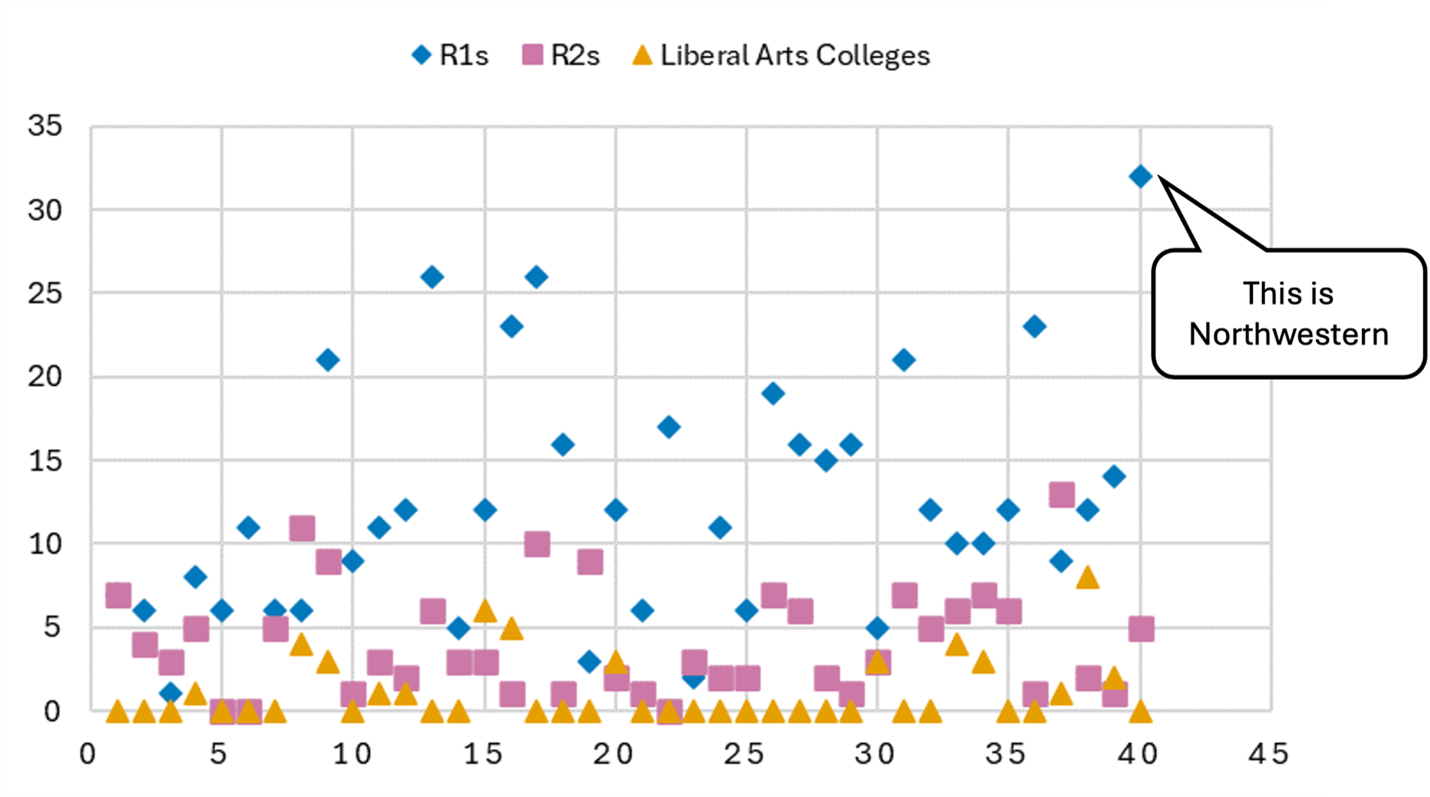By Pamela Shaw, Biosciences & Bioinformatics Librarian
During the fourth quarter of 2023 through January 2024, a small team of members from Northwestern University Library, Galter Health Sciences Library and NUIT Research Computing and Data Services participated in a research study conducted by Ithaka S+R. The study is intended to get a survey of the variety and depth of research data services among several universities and colleges from the US and Canada. Northwestern University was in the second cohort of this study.
Cohort and methodology
The cohort consisted of 120 US institutions, divided equally into R1, R2 and liberal arts colleges (by Carnegie Classification), plus 8 Canadian institutions. Our teams were tasked with doing a web-based inventory of data consultation or training services, recording what type of service was provided (categories included GIS, visualization, bioinformatics, statistics, general data management), and what unit offered the service (e.g. academic department, research office/core facility, IT or the libraries). After these inventories were complete, we then interviewed a sampling of volunteer researchers on their data practices and needs.
Results
The results of the inventory phase were published in March 2024 by Ithaka S+R. We encourage our users to look at the report. Not surprisingly, R1 institutions offer more data services than R2 or liberal arts colleges.
The figure below is reprinted from the report and shows where Northwestern stands among our cohort. Though institutions are not identified by name in the results, since we conducted the inventory, we know how many services are offered by our university. By sheer number of services offered, Northwestern offers more services than any other institution.
Number of research data services offered at each school in three Carnegie Classifications

Quantity does not necessarily indicate quality: some training sessions we discovered may have been offered sporadically or as one-off sessions. Some services are only available to members of specific departments or research units. However – as we were doing the inventory – we discovered that Northwestern’s research computing services and libraries offer training and consultation in more types of data services than are typical even among R1 institutions. We are quite proud of that, and we want to do more.
Our interviews
In our interviews, we strived to include a variety of researchers: grad students, post docs, faculty and technical staff. Our interviewees came from the humanities, social sciences, biomedical sciences and engineering. Here were some of the broad themes from our interviews:
- Our interviewees are interested in the best options for data storage – space, cost, and security.
- Data management, cleaning and organization are time-consuming for everyone.
- Almost everyone is thinking about data sharing in compliance with funder or publisher requirements.
- Most of our interviewees are already using AI (mostly ChatGPT) for some of their practical tasks: to translate code written in one language to equivalent code in another language, to generate code for repetitive tasks, etc.
- Not everyone is aware that the libraries offer data training and consultation.
What does all this mean for our users?
Northwestern researchers have many places to go for data support and services. Our core facilities offer expert analysis and consultation. Sometimes these services are offered for a fee, so we encourage our grant-funded investigators to consider data analysis, consultation, and storage costs when writing their grant budgets. The libraries and NUIT Research Computing offer almost all services for free, and we refer users with more complicated needs to the core facilities, when appropriate.
The data landscape is always changing, and we at the libraries and research computing are working together to help our users navigate this landscape.
- NUIT recently created a Research Data Management and Sharing site, with lots of information and links to useful services; NUIT Research Computing and Data Services has many workshops on diverse computing and data topics.
- NUIT and the libraries are using a shared ticketing system to respond to data-related questions, so our users can be assisted by the best expert for their question(s), all supported by a team with diverse skills.
- NU Libraries have Geospatial and Data Services, with links to upcoming classes and consultation request forms.
- Here at Galter Library, we have the DataLab for our Feinberg users and our Senior Data Librarian, Sara Gonzales, has created some valuable guides and classes on data management.
Updated: June 28, 2024